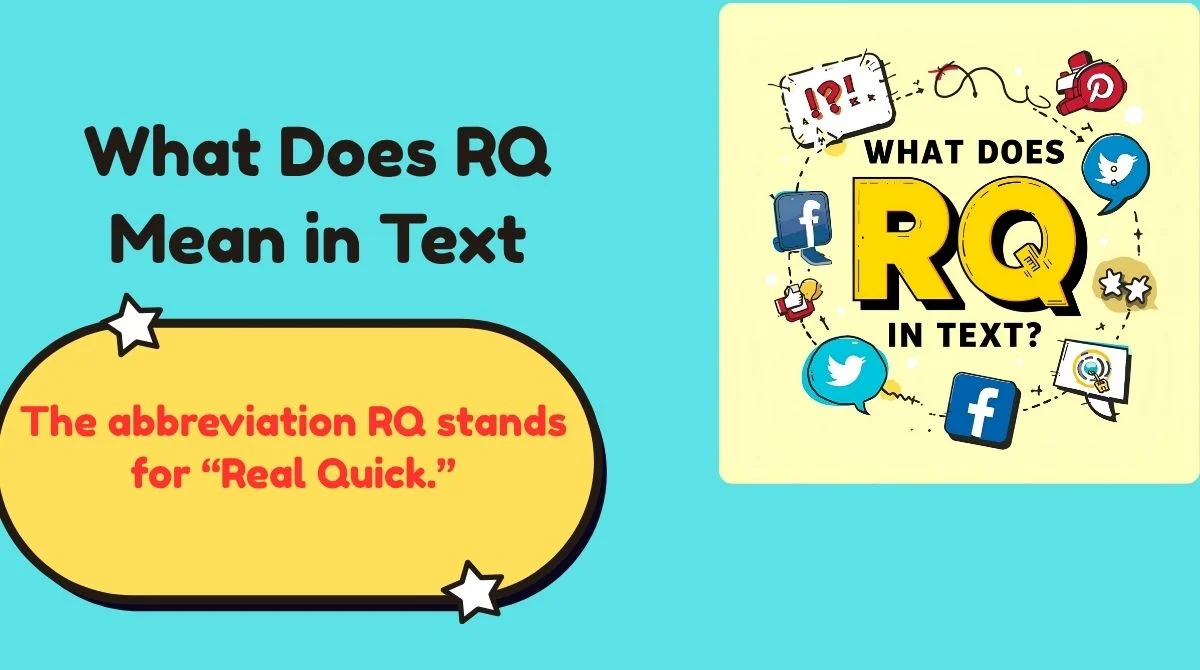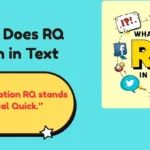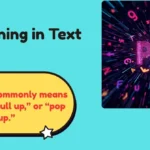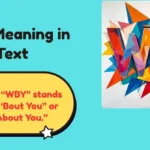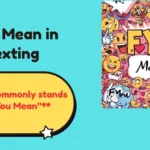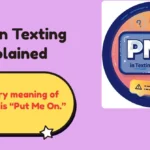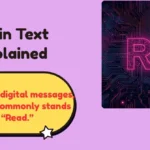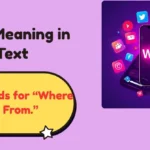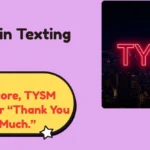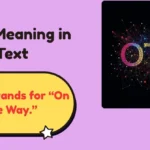Have you ever opened a message that ended with “RQ” and thought, wait, what’s that supposed to mean?
Don’t worry — you’re not alone. Abbreviations like RQ pop up everywhere these days — from text messages to office chats — and they can be confusing at first glance.
In this guide, we’ll dive deep into what RQ means in text, how and when to use it, situations to avoid it, and even smarter alternatives for different tones — whether you’re chatting with a friend or emailing your boss.
What Does “RQ” Mean in Text?
The abbreviation RQ stands for “Real Quick.”
It’s used to signal something brief or immediate — like saying “just a sec” or “really fast.”
Example:
“Hey, RQ—can you check your email?”
Here, “RQ” simply means “real quick.” It’s a way to make a message sound fast-paced and to-the-point.
However, the meaning of RQ can shift depending on context. Here are a few examples across different settings:
| Context | Meaning | Example |
|---|---|---|
| Texting | Real Quick | “Can I call you RQ?” |
| Business Chat | Real Quick | “Need your approval RQ.” |
| Academic | Research Question | “Your RQ should be clearly defined.” |
| Gaming | Rage Quit | “He did an RQ after losing the match.” |
While “Real Quick” is the most common meaning in texting and casual conversations, knowing these other meanings helps you avoid awkward misunderstandings.
Where Is “RQ” Commonly Used?
“RQ” shows up across many platforms — mainly where people value speed and informality.
You’ll often spot it in:
- Text messages
- Slack or Microsoft Teams chats
- Discord servers
- Instagram DMs
- Group project chats
- Online gaming communities
Who Uses It the Most?
- Gen Z and Millennials love quick shorthand.
- Digital teams use it to save time during real-time communication.
- Gamers often throw it in chats when they need to say something real quick before gameplay starts.
For example:
“RQ—what’s the meeting code?”
“Can we talk RQ before the client joins?”
It’s all about convenience — keeping communication short but functional.
Tone and Context: When to Use or Avoid “RQ”
The tricky part with abbreviations like “RQ” isn’t just knowing what they mean — it’s understanding when to use them.
Tone and context matter more than you think.
Example:
- Casual: “Hey, RQ—what time’s the game tonight?”
- Workplace: “Send the report RQ.” (Sounds abrupt)
The first feels friendly. The second? A bit too sharp. That’s why understanding tone is key before dropping an “RQ” into your message.
✅ When It’s Okay to Use “RQ”
“RQ” fits perfectly in informal situations where messages move fast and tone is light.
Here’s when you can safely use it:
- Chatting with friends or siblings
- Messaging coworkers you know well
- Asking for a quick update or favor
- Sending a short ping before a meeting
Good Usage Examples:
- “Hey, RQ—are we still on for lunch?”
- “Can I ask you something RQ?”
- “Ping me RQ before the client call.”
Basically, use “RQ” when time matters, but tone doesn’t.
❌ When to Avoid Using “RQ”
There are times when “RQ” feels too casual or unprofessional.
Avoid It In:
- Formal emails or business proposals
- Messages to clients or superiors
- Academic or official writing
- Sensitive conversations
Why? Because abbreviations like “RQ” can sound rushed or dismissive.
Example:
❌ “Can we discuss your report RQ?”
✅ “Could we have a brief discussion about your report?”
When clarity, tone, or respect matters — always choose full words over shortcuts.
15 Better Alternatives to “RQ” (Professional, Polite & Casual)
Sometimes “RQ” feels right, but the situation calls for a softer or more polished phrase.
Here are 15 smarter alternatives depending on your tone and audience.
Polite & Professional Alternatives
When you want to sound respectful but brief:
- “At your convenience”
- “May I interrupt you for a moment?”
- “Could I trouble you quickly?”
- “I just need a second of your time”
- “If you have a brief moment”
Example:
“At your convenience, could you review this file?”
“Could I trouble you quickly to confirm the schedule?”
Neutral / Everyday Tone Alternatives
Perfect for messages with friends, peers, or colleagues:
- “Quick question for you”
- “Got a sec?”
- “Do you have a moment?”
- “Can I ask you something quickly?”
- “Just a quick follow-up”
Example:
“Got a sec? Need to check one detail.”
“Quick question for you about tomorrow’s event.”
Casual & Friendly Alternatives
Lighthearted, natural, and text-ready options:
- “Real fast—can I ask you something?”
- “Can I snag you for a quick sec?”
- “Quick check-in”
- “Wanted to ping you real quick”
- “Just a quick ask”
Example:
“Hey, wanted to ping you real quick—are we still on?”
“Quick check-in: did you send that meme yet?” 😄
Choosing the Right Phrase for the Right Tone
The tone you choose can change how your message feels — even if it says the same thing.
Think of it this way:
“Hey RQ—need your help”
versus
“Hey, got a sec? Need your help real quick.”
The second one sounds friendlier and less abrupt.
Tip: Match your tone to the relationship, not the clock.
If you’re texting a friend, abbreviations are fine. If you’re messaging your boss, full sentences win every time.
Why You Should Avoid “RQ” in Formal Writing
Professional communication relies on clarity and tone. While “RQ” is harmless in casual settings, it can create the wrong impression at work.
Using abbreviations can:
- Make you appear rushed or careless
- Confuse readers unfamiliar with slang
- Undermine the formality of your message
Quote from Communication Expert, Emily Post Institute:
“Professional tone isn’t about stiffness — it’s about ensuring your message is received with respect and clarity.”
So if your message involves clients, supervisors, or business partners, skip the abbreviations. Write it out.
How to Use “RQ” Properly — With Real Examples
Let’s look at some realistic examples of using “RQ” the right way (and the wrong way).
| Scenario | Good Example | Bad Example |
|---|---|---|
| Friendly text | “Hey, RQ—what’s the plan tonight?” | “RQ what’s plan.” |
| Team chat | “Can we huddle RQ before launch?” | “Join meeting RQ now.” |
| Work message | “Quick one RQ—did we finalize pricing?” | “Reply RQ please.” |
| Group chat | “RQ, who’s bringing snacks?” | “RQ snacks?” |
Notice how tone, punctuation, and context affect readability.
Even in casual use, a little courtesy goes a long way.
RQ vs Other Abbreviations — Don’t Mix Them Up
It’s easy to confuse “RQ” with other text abbreviations. Here’s a quick comparison:
| Abbreviation | Meaning | Tone | Common Use |
|---|---|---|---|
| RQ | Real Quick | Casual | Texting / Messaging |
| BRB | Be Right Back | Casual | Chat rooms / Games |
| ASAP | As Soon As Possible | Neutral / Work | Emails, texts |
| TBH | To Be Honest | Casual | Personal messages |
| FYI | For Your Information | Neutral | Work or info sharing |
Each abbreviation has its place. “RQ” leans most informal — good for friends, not bosses.
Common Misunderstandings About “RQ”
One reason “RQ” confuses people is because it carries different meanings in other fields.
- In academics, “RQ” means “Research Question.”
- In gaming, it can mean “Rage Quit.”
- In texting, it’s “Real Quick.”
So, if your professor texts “Work on your RQ,” don’t rush — they’re not asking for a quick reply! Context is everything.
Quick Etiquette Tips for Text Abbreviations
Want to sound modern but still clear? Follow these golden texting rules:
- Know your audience — abbreviate with friends, not formal contacts.
- Use abbreviations sparingly — they should simplify, not confuse.
- Avoid using more than one abbreviation per message.
- Re-read before sending — clarity beats speed.
- When in doubt, spell it out.
Case Study:
A marketing manager once sent “Need this deck RQ.” The intern thought it meant “Research Question.” Result? Deadline missed. Lesson: shortcuts save seconds but can cost clarity.
Final Thoughts: Keep It Real, Not Just “RQ”
Shortcuts like RQ make communication faster — but speed shouldn’t replace connection.
Texting is meant to be efficient, not robotic. When you type “RQ,” make sure it fits the tone and the person you’re talking to.
In a world where everyone’s rushing, a thoughtful message stands out more than a fast one.
“Write fast if you must, but never at the cost of being understood.”
So go ahead — use “RQ” when it feels natural. Just remember: the best communication is always real, not just real quick.
FAQs About “RQ Meaning in Text”
What does RQ mean in text?
“RQ” stands for “Real Quick.” It’s a shorthand used in texting and online chats to mean “really fast” or “just a moment.”
Is RQ appropriate in emails?
Not really. “RQ” is too informal for emails, especially professional ones. Instead, use phrases like “briefly” or “at your convenience.”
Does RQ mean “Research Question” too?
Yes, in academic writing, “RQ” refers to a Research Question, not “Real Quick.” Always check the context.
What’s the difference between RQ and ASAP?
“RQ” means you want something briefly or quickly, while “ASAP” means you want it as soon as possible. “RQ” is for short interactions; “ASAP” is for urgency.
Can I use RQ on social media?
Absolutely. It’s common on platforms like Instagram, Snapchat, or Discord. Just make sure your followers or friends understand what it means.
